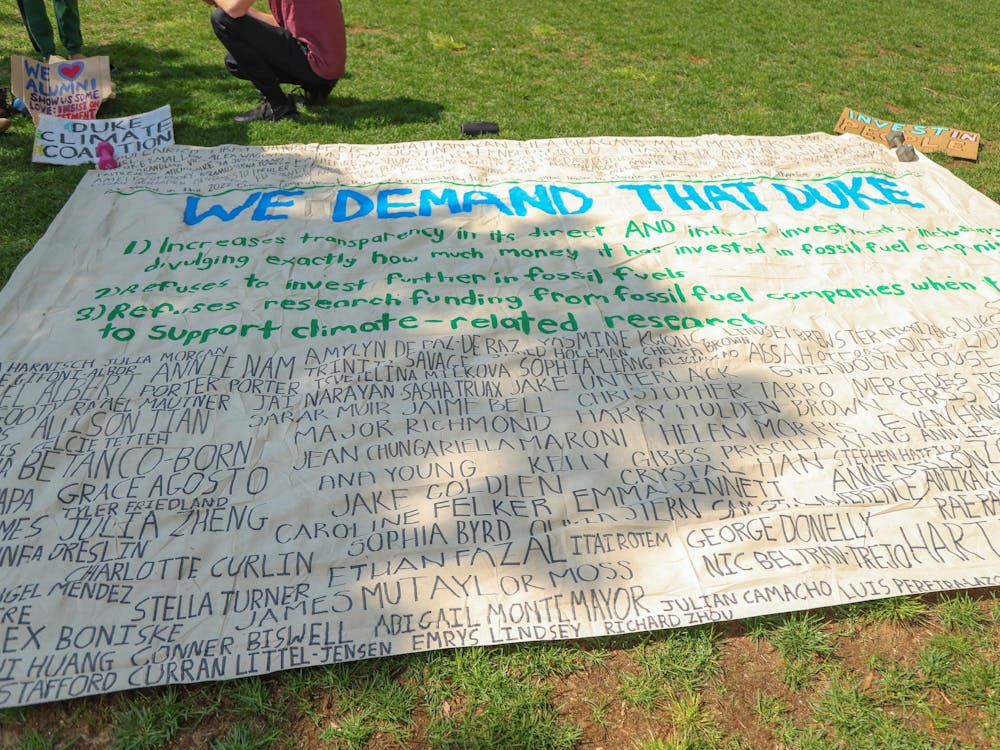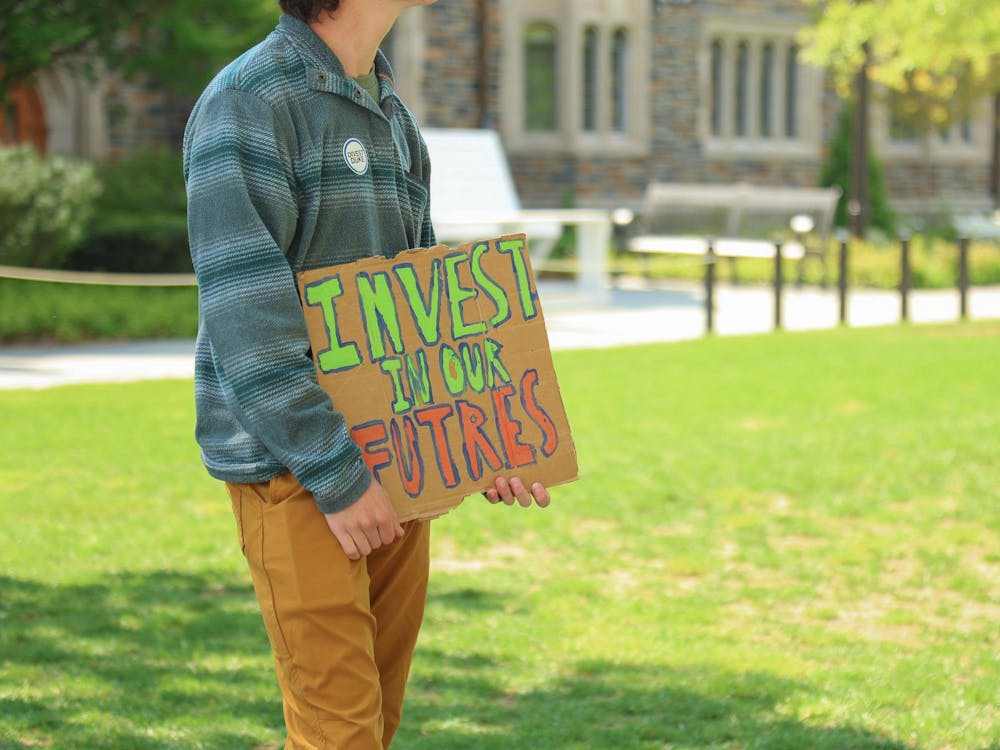Around a dozen members of Duke Climate Coalition staged a protest on Abele Quad Thursday, urging the University to increase transparency around its endowment funds and reduce its reliance on fossil fuel investments.
The demonstrators called on Duke administration to stop future investments of endowment funds in fossil fuel companies, refuse to collaborate with those companies on climate-focused research and increase transparency around which companies endowment funds are invested in.
“We're all part of Duke University, so I feel like we all have a right to know where all the Duke money is going,” first-year Chase Locascio said.
Despite recent federal funding threats that have cast uncertainty over the University’s finances, sophomore Zoe Farris, DCC’s internal actions project manager, believes that “pushing for [divestment] on a grassroots level” is more important now than ever.
Students gathered on Abele Quad at 11 a.m., many holding cardboard signs with messages including “The climate is changing, so why aren’t we?,” “Invest in our Futures” and “Planet over Profit” around a large white sheet with roughly 160 signatures from Duke students and faculty supporting the group’s demands.

DCC estimates that Duke’s endowment invests anywhere from $100 million to $200 million in the fossil fuel industry.
“We're not ignorant to the fact that Duke wants to grow its endowment,” said sophomore Cassidy Rose, DCC’s finance and logistics director. “But we’ve looked at other institutions like Princeton [University] who have successfully divested in the past … They’re doing fine as other higher [education] institutions, and we really think we can take a note out of the book from them.”
The group ultimately hopes to see Duke fully divest from fossil fuels, though Farris said such a move is unlikely for now, as Duke’s Advisory Committee on Investment Responsibility has previously rejected complete divestment proposals. Instead, she described preventing future investments as a “baby step” toward their long-term goal.
DCC Co-president Fisher Mallon, a sophomore, added that divestment serves as an opportunity for the University to stand out as an institution.
“What leading scientific frameworks — for example, the Science Based Targets Initiative — are saying is that we need to stop new investments in fossil fuels and transition to investments in clean energy and climate solutions,” he said. “… We want Duke University to be a leader in that space.”
In September 2022, the University launched its Climate Commitment with the support of a $36 million gift, pledging to unite University resources to achieve climate change adaptation and mitigation goals in key focus areas.
Since then, the University has achieved carbon neutrality, a milestone that “has been hard fought, humbling work,” according to an Oct. 21 email to The Chronicle from Toddi Steelman, vice president and vice provost for climate and sustainability. “[W]e are not yet done — in many ways we are just beginning,” she added.
Though Farris believes that carbon neutrality is a “great accomplishment,” the group wants to “force [Duke] to go farther.”
“Divestment particularly is symbolic,” she said. “… But the truth is that a lot of … peer institutions of Duke have already divested, and it stigmatizes the fossil fuel companies. It shows that we’re not okay with what they’re doing.”
Farris pointed out that partnering with fossil fuel companies for research initiatives also undermines climate progress, as it “allows fossil fuel companies to say that they are benefiting the environment.”
“There’s a long track record of fossil fuel organizations … funding research that suggests that climate change isn’t as pressing of a problem,” Mallon added.
Farris also highlighted how climate change disproportionately affects marginalized communities — a key reason behind the group’s advocacy. But for many demonstrators, the motivation to protest was also deeply personal.
Both Farris and Mallon spoke about growing up exploring the outdoors and their desire to preserve those spaces for future generations.
For Locascio, who is from Asheville, “Hurricane Helene really put into perspective the impacts of climate change.” He noted that similarly intense natural disasters could be much more frequent in the future, due to climate change.
Get The Chronicle straight to your inbox
Sign up for our weekly newsletter. Cancel at any time.
As sophomore Annie Cushman, an environmental sciences major, signed the poster of demands, she noted that her father “works at the national parks,” making her a “big fan of everything outdoors.”
“I think these places need our help right now, and this is one of the ways to do that,” she added.
Onlookers like Olivia Kallmeyer and her father Ian, who were visiting campus to look at Duke’s law school, stopped to take photos of the protest and comment on the importance of the students’ message.
“Without a planet, everything else is just irrelevant,” Ian Kallmeyer said.
Max Tendler is a Trinity first-year and a staff reporter for the news department.

